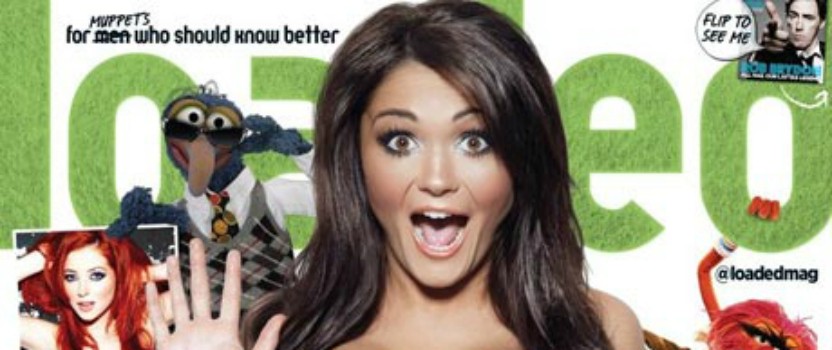Loaded, the title from which all lads mags sprang, is to be sold for the second time in as many years. Its publisher, Vitality, was taken into administration last week, owing creditors £1m and liquidators Cooper Young have been tasked with dispensing with Vitality's assets. By all accounts there has been some interest in the magazine, but its currency has never been lower.
Loaded's latest circulation figures show a 30% year-on-year fall to an average of just 34,505 copies. For those unfamiliar with magazine sales, that is not good. Not good at all.
This is a long drop from a great height. In its glory years (the late nineties) the title regularly sold 450,000 copies and was a priority booking for advertisers seeking the eye of the aspirational, over-sexed and often 'loaded' young man. The brainchild of James Brown (not that one), Loaded was in part inspired by adult comic Viz, punk fanzines and the desire to tap the male lifestyle market like a ballsy Cosmopolitan.
Naturally, sport, beer and sex were high on the agenda and the publication soon became renowned for its revealing underwear shoots with minor celebrities. Perhaps surprisingly, its first cover star was Gary Oldman and other early issues led with Michael Caine and George Best. So, initially at least, the 'glamour' photography was reserved for the inner pages. Nevertheless, Loaded's rush of success was so convincing that other publishers copied the format for FHM, Maxim and eventually the low-market weeklies Nuts and Zoo. The men's mag market is now so flooded it's easy to imagine it has always been with us, but in 1994 Loaded was a breath of fresh air. With impressive shrewdness, the founding team spotted a shift in the national culture. As Oasis dominated the musical landscape, Chris Evans regaled Radio 1 listeners with his boozy adventures and the metropolitan middle-classes discovered a love of football, Loaded arrived to be the house magazine of the laddish zeitgeist. The strapline ' For Men Who Should Know Better' was not only a brilliant marketing gambit, it was the perfect mission statement.
For a few years, Loaded stood apart from its imitators thanks to a self-effacing sense of humour and its position as a guilty pleasure rather than a posh, soft porn title. Cleverly chosen columnists (Richard Bacon, Irvine Welsh, even Alan Partridge and Germaine Greer) rubbed shoulders with intelligent, lengthy features, beautiful women and groundbreaking, award-grabbing layouts. It was a winning formula, but the challenge in capturing the spirit of the age comes when time moves on. The 'lads and ladettes' movement soon began to pall, Britpop became a bit embarrassing and Evans walked out of the BBC.
That's not to say lads' mags immediately withered on the vine. Many readers had adopted them as a feature of their lives and still bought into their flippant, matey content. Until the the digital revolution.
By the earlier noughties, daily internet use and widespread broadband were causing anxieties in the print media. Newly launched men's titles like Jack and Later failed to find a viable audience and, by now, Loaded was almost indistinguishable from any other blokey magazine. The ability to read about drinking beer and watching football was no longer a novelty and the urge to see lovely ladies in alluring poses could be easily and instantly sated by a million websites. A new zeitgeist had arrived and it was called the internet. Suddenly magazines looked a bit old hat.
As you'd expect, all these magazines launched their own websites - but they were never designed for the platform and very few of them did anything innovative or intelligent with the new technology. Where they had been leaders in the magazine business, they were forced to play catch-up with their on-line editions.
If Loaded was to survive in such a brave new world, it needed a massive re-invention, a revolution to place it back on the cutting edge, leading men's media as it had done so brilliantly before. Instead it was sold by IPC to Vitality in 2010 and, although it was named one of the top fifty magazines of all time, under Vitality's direction its readership shriveled to that of a niche title, leaving its future as uncertain as that of the parent company.
It's always a shame to see a great concept (and in 1994, Loaded was a fantastic concept) diminish so dramatically and, of course, Loaded may yet continue. But there's something inevitable about this. Like MSN Messenger, TFI Friday and Max Headroom - some media projects are very much of their time. They burn brightly and cause considerable excitement, but the world turns and where a magazine once fitted the culture like a glove it finds itself adrift with no natural constituency. That doesn't detract from its glory and achievement, but it does mean it's time to clear away the pint pots and put coats across the shoulders of the dancing girls. Loaded's content no longer has mass appeal, its format is predictable and tired, and its platform static and expensive. For Loaded (and many of its compatriots) the party is over.
But if they expected it to end any other way, perhaps they really should have known better.
UPDATE: Loaded magazine was bought this week. The new proprietor intends to increase the flesh on display and reduce the number of articles.
Magnus Shaw - writer, blogger and broadcaster
www.magnusshaw.co.uk
www.creativepool.co.uk/magnusshaw





